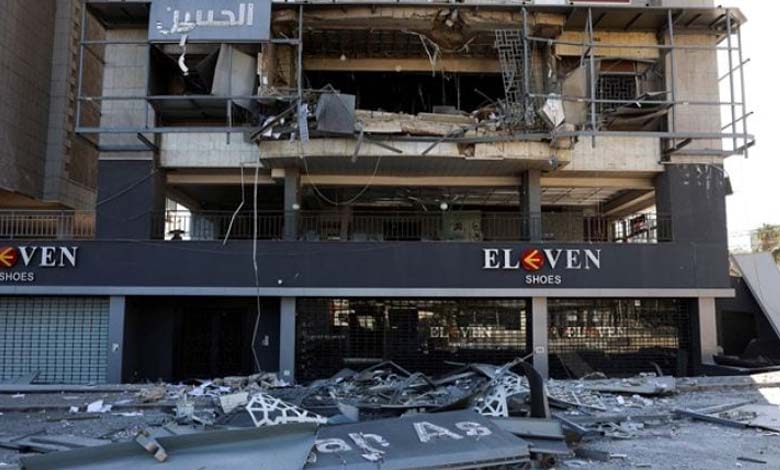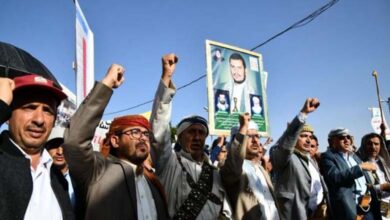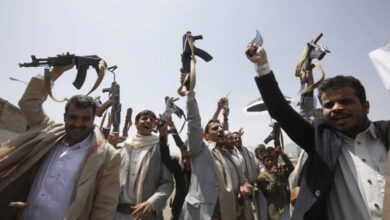Israel’s Attempt to Break ‘Al-Qard Al-Hassan’: Cutting Hezbollah’s Financial Channels
Hezbollah's opponents criticize the ‘Al-Qard Al-Hassan’ institution, claiming it is not subject to the country’s banking system oversight.

The Israeli airstrikes on the headquarters of Al-Qard Al-Hassan, which Western and local powers consider to be Hezbollah‘s financial arm, have brought the institution back into the spotlight. It gained widespread popularity by offering low-interest loans, especially to members of the Shia community. However, the Israeli attack on this financial arm will affect many Lebanese who had recently benefited from its funding. Additionally, it will impact a significant portion of Hezbollah‘s funding as the group faces a tough confrontation, betting on dragging Israel into a prolonged war of attrition.
-
Sources: Hezbollah’s Deputy Secretary-General Flees Lebanon for Iran after Nasrallah Assassination
-
Hezbollah relies on new leadership whose members are unknown to Israel
Hezbollah’s international funding, particularly from complex networks in Latin America, has decreased due to Western sanctions led by the United States, aiming to dry up the group’s funding sources. These sanctions target front companies and individuals suspected of circumventing restrictions.
This situation has brought Al-Qard Al-Hassan to prominence locally, as Hezbollah can mobilize internal funding sources. Iran also plays a significant role in strengthening Hezbollah’s financial empire through secret financing and continuous arms supplies. However, Western sanctions on Tehran have significantly reduced the flow of Iranian funds, pushing Al-Qard Al-Hassan to the forefront.
-
“New Phase”: Hezbollah Announces Escalation of Clashes with Israel
-
“Target Tel Aviv”: Hezbollah’s New “Qader 2” Ballistic Missile
In a country still reeling from a crippling economic crisis, the loans and banking services provided by the association are highly popular, particularly within the Shia community.
Al-Qard Al-Hassan has been under U.S. sanctions for several years, with Washington accusing it of being a cover for Hezbollah’s financial activities. The association has around 30 branches in Beirut and many other areas and has been registered with authorities since the 1980s.
-
Iran Faces a Dilemma… Who Will Be the Successor to Hezbollah?
-
Finances under fire: Hezbollah faces financial crisis
It gained popularity by offering interest-free loans according to Sharia law, which prohibits usury, in a country where traditional banks have almost ceased operations over the past five years due to a prolonged economic collapse.
On Sunday night, Israeli strikes targeted Al-Qard Al-Hassan branches in the southern suburbs of Beirut, a Hezbollah stronghold, and in southern cities like Tyre and in the Bekaa Valley to the east.
-
Hezbollah Prepares for War of Attrition with New Leadership to Lead the Battle
-
Hezbollah Foils Israeli Ground Incursion Attempts
Before the strikes, the Israeli military described the institution as “participating in financing Hezbollah’s terrorist activities against Israel.”
A senior Israeli intelligence official said on Sunday that the main goal was to weaken trust between Hezbollah and a large part of the Shia community that uses Al-Qard Al-Hassan as a bank.
-
Disengagement from Gaza: Did Hezbollah accept in private what it publicly rejected?
-
Targeted by Hezbollah: What Do We Know About the Israeli Galilout Base?
Al-Qard Al-Hassan is part of a network of associations, schools, hospitals, and cooperatives established by Hezbollah to provide services to its base, boosting its popularity within the Shia community.
The association offers small loans to business owners and small and medium agricultural or industrial enterprises. In a country
The Al-Qard Al-Hassan Association offers simple loans to small and medium-sized agricultural or industrial businesses. In a country suffering from frequent power outages, the organization also provides loans to individuals and municipalities for purchasing solar panels to generate energy.
-
Hezbollah and Revolutionary Guard Experts under Houthi Suspicion: New Arrangements in Yemen
-
Caesarea under Fire: Hezbollah Rockets Near Netanyahu’s Home
In February 2023, the association posted an announcement on social media stating that it provides “loans in Lebanese pounds backed by gold.”
When banks in Lebanon suspended lending due to the economic collapse, the Al-Qard Al-Hassan Association boasted about granting 212,000 loans with a total value of $553 million “despite the crisis” in 2020 and 2021.
The association claims it gives loans “to all Lebanese.” Christian and Sunni customers confirmed to AFP that they turned to the organization, which opened offices outside Hezbollah‘s traditional strongholds.
-
Hezbollah Engages in Violent Clashes with Israeli Army near Border
-
The Role of Hashem Safi al-Din in Hezbollah: Is He Considered the Second in Command After Nasrallah?
One customer, preferring to remain anonymous, said, “You deposit gold, and they give you cash equivalent to it, then you pay it back without interest.”
Professor Amal Saad, a lecturer at Cardiff University and an expert on Hezbollah, explained in a post on X that Al-Qard Al-Hassan has become “a lifeline for more than 300,000 Lebanese who have deposited their savings in it and rely on the NGO for interest-free loans.”
Iran helped establish the association in the 1980s, but it is now self-funded, primarily by the Lebanese Shiite community, according to Saad, who noted that 85% of its customers are Shiite.
-
The Sole Survivor of Hezbollah’s Leadership: Who Is Abou Ali Reza?
-
A $7 Million Bounty on Its Leader: What Is Hezbollah’s Most Dangerous Unit, “The Shadow Unit”?
Saad believes that targeting Al-Qard Al-Hassan is part of a “collective punishment” for the Shiite community, adding that “Israel targets the association as part of its strategy to impoverish the environment,” which has worsened due to displacement caused by war.
Saad views the strikes as a manifestation of “Israel’s failure to conduct significant incursions into southern Lebanon, resorting instead to attacking civilian institutions that hold no military value.”
In Lebanon, Hezbollah opponents criticize the Al-Qard Al-Hassan Association for being unregulated by the country’s banking system. The association presents itself as an NGO, licensed by the Ministry of Interior.
-
Hezbollah Faces Two Choices After Nasrallah’s Assassination: Crushing Retaliation or Defeat
-
Gaza Setback and the Success of Israeli Spies: An Analysis of Hezbollah Infiltration
This is not the first time the organization’s activities have been controversial. In 2007, the U.S. Treasury froze the association’s assets, and in 2021, it imposed new sanctions on several individuals linked to it.
The U.S. Treasury accused the association of being “used by Hezbollah as a cover to manage its financial activities and to gain access to the international financial system.” It also accused the association of accumulating foreign currency to enable the group to build a supporting base.
The Treasury adds that the association “while claiming to serve the Lebanese people, is actually conducting illegal money transfers through fictitious accounts and intermediaries, exposing Lebanese financial institutions to potential sanctions.”
-
Israel Considers Ceasefire with Hezbollah While Continuing Escalation
-
Can Hezbollah stand up to Israel? Iranian President expresses doubts
In a related context, the Israeli army stated on Monday that it struck a Hezbollah hideout containing tens of millions of dollars in cash and gold during airstrikes targeting the group’s financial network.
Military spokesman Daniel Hagari said, “The Israeli Air Force carried out a series of precise strikes on Hezbollah‘s financial strongholds,” adding, “One of our main objectives last night was an underground vault containing millions of dollars in cash and gold. The money was used to finance Hezbollah‘s attacks on Israel.”












